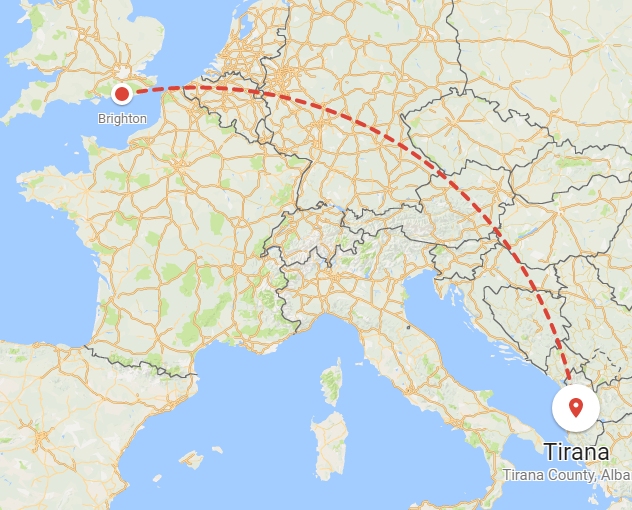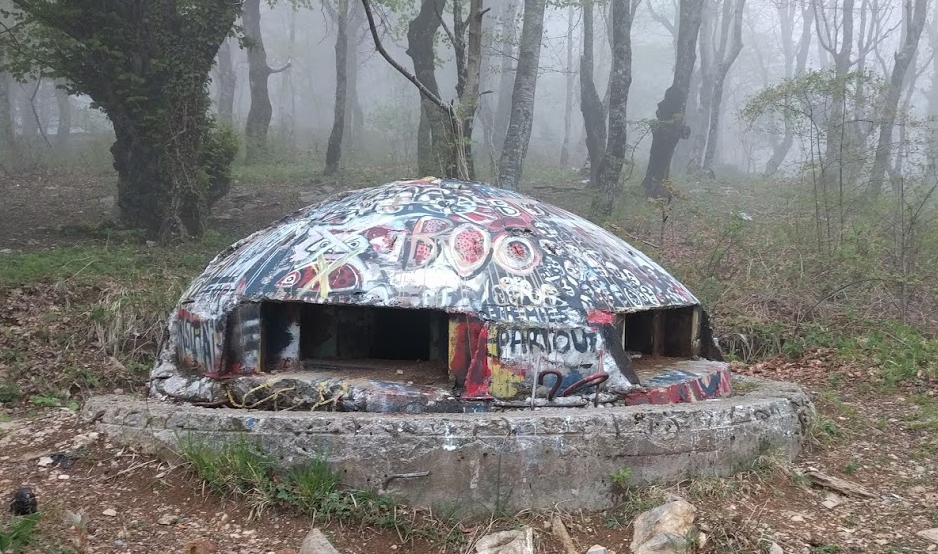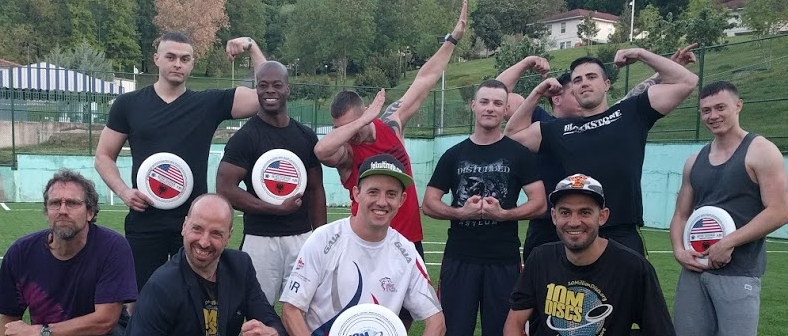Albania: Introducing Ultimate to an entire country
I recently travelled to Albania for eight days as part of a 10 Million Discs project in the Balkans. There were 5 of us present for most sessions – Trent Simmons (Founder & President of 10 Million Discs), Juan Amado from Columbia (coach), James Martin (coach), myself (head coach), and Erjona Kurti from the US Embassy.
Also see: Full Google Photo album | Full day-by-day blogs from Albania
10 Million Discs is an international youth development NGO which engages youth through sports, frequently with a focus on bringing together people from countries or cultures with a history of conflict. By engaging them in a fun, new activity, 10MD are able to break down barriers whilst teaching conflict resolution, gender equality, mutual trust, personal accountability under pressure, and other important life skills. At the same time, 10MD programs are also tailored to advance social and humanitarian causes unique to the host country and communities.
In the build up to our trip, the US Embassy in Tirana worked together with the School Sports Federation, and arranged for 250+ PE teachers (covering 7 of the 10 major cities) to come together and learn from us how to teach Ultimate and its self-refereeing principles to their pupils. They produced 200 “Better Together” discs to be distributed amongst the schools, featuring US and Albanian flags, and 10 rules of Ultimate printed directly onto the discs in Albanian with English translation. Alongside  the teacher-training sessions we also worked directly with a number of youth groups to introduce the sport, the principles of Spirit, and how they relate to real life skills.
the teacher-training sessions we also worked directly with a number of youth groups to introduce the sport, the principles of Spirit, and how they relate to real life skills.
Ultimate in Albania has been fairly sporadic over the last decade or so, with no sustained clubs in existence and no pickup happening currently. In the past there has been the occasional team or game, mostly comprising of ex-pats, but even that seems to have faded out now.
PE Teacher Training
In order to introduce the game across the whole country, our highest priority were the PE teacher-training sessions being held at the big cities – Kavaja, Shkoder, Durres, Tirana, and Vlore (plus Fier and Elbasan after I left). We went equipped with discs, a translator (most Albanians over 25 years old do not speak English), and a sound system for the sessions. The venues were varied and often challenging due to the high number of participants, but we made do with what we had to deliver the best sessions we could.
Each teacher-training session had 50-70 PE teachers attending, maximum 2 per school. Each session started with us explaining four cornerstones of 10MD’s take on Spirit of the Game / self-refereeing – Personal Accountability Under Pressure, Gender Equality, Mutual Respect, and Conflict Resolution. We introduced Ultimate as not only a new sport, but as a new approach to sport.
Several teachers told us that such an approach (relying upon mutual trust & fair-mindedness in the heat of competition) would not work in Albania – a country which has a lot of problems; where life can be a struggle, people have their guard up, and a ‘take what you can get’ mentality is pervasive. However, we held strong that Spirit does work, and that the game of Ultimate ceases to function if mutual trust is not present – therefore those who play will quickly learn the importance of trusting and being trusted. We also expressed our hope that through playing Ultimate, the youth in Albania will learn new ways to approach situations in life where mutual respect and non-confrontational conflict resolution can go a long way, rather than following the example of some current sports (such as the most popular in Albania – soccer), which often reinforce a different way of thinking.
The teacher-training sessions were challenging for a number of reasons (oversubscribed venues, communication issues), but we learnt a lot from each one, and we hope the teachers did too. Every teacher went away knowing the basic rules of the Ultimate at the very least, and at the most they understood spirit, good technique, and learnt some drills which they can run at their schools. Considering how the numbers scale up in terms of pupils getting to play the sport, I believe our PE teacher training program will give Albanian Ultimate a healthy kickstart, and I would expect a few Ultimate communities to take shape, develop, and grow over the coming years. Once a certain number of teams form and are recognised by a certain number of NGOs, an Albanian Flying Disc Federation can be established. After I left Albania, Trent met with the president of the School Sports Federation who said he wants to ideally start the Albanian HS Ultimate national championships next year, citing potential for SotG principles to change Albanian society as his primary reason for endorsing us. The cost savings of not needing referees was also mentioned as a big edge over other sports.
US Marines
As well as PE teacher training, we ran a number of sessions with other groups; one was at a gated community connected to the US Embassy, where kids and their parents came to learn about the game and take part in fun drills & games. Also present at this session were 7 US Marines. Speaking to one who had played before, he said that Ultimate was played amongst the marines in Baghdad “like a religion” – he would take part in games which would grow to 10v10 in size. Interesting to know! I imagine it’s favoured amongst marines due to the minimal equipment needed, the low risk of injury due to contact, the high levels of fitness that can be used, and the way it encourages and rewards good teamwork. The marines who hadn’t played before picked it up very quickly, and using them to demo a drill was a fantastic experience as a coach – not sure I’ll ever have a beginner group again who listen to and follow instructions so clinically!
The marines also fell into team roles very quickly. One tall guy would defend the end zone and get the disc moving on the turn. A particularly quick-turning guy from New York had mastered end zone cutting by the end of the session and scored many, many points. Loads of them had awesome American-football style toeing-in ability, which was great to see. Whilst they were playing, we also had two other pitches set up for the kids & parents in the gated community, meaning everyone could play at the same time at a level they were comfortable with.
Juvenile Prison
We ran a number of sessions directly with youth in the cities we were working in – a model UN group, members of the Roma community, a few sports clubs, the political youth groups, and a session at a juvenile prison. The prison session was a very memorable and humbling experience – there were high levels of participation (43 inmates), though the prison warden stopped us from playing cross-cellblock games as we had hoped in case trouble started. We had four games going at the same time, and all the players I saw were enjoying themselves and playing fair – avoiding contact where they could, and settling disputes peacefully and respectfully on the field as and when they arose. As with any group, encouraging them to discuss the call between the two players involved would quickly lead to a resolution – usually the fairest one too. In the yard we were surrounded by 15ft high walls and almost all the prison guards were surrounding the pitches whilst we were playing.
Political Youth Groups
We brought together three political youth groups, who played alongside each other as team mates for the first time, all of them learning the rules of the game and how to resolve disputes together. Some of them were really competitive and weren’t afraid to make calls (again, easily settled when the two parties involved are encouraged to discuss it between themselves), nor were they afraid to sky each other and throw themselves around after the frisbee to make awesome catches and interceptions. Initially there was some unwillingness to inter-mingle between groups, but through learning the rules together, translating for each other, sorting out calls and figuring out tactics, we saw plenty of barriers being broken down and the youth really embrace the ideals of mutual trust and respect, despite their political differences in a time of political tension.

3 political youth groups learn Ultimate and SotG ideals of mutual respect during conflict resolution
National TV appearance
Towards the end of my stay we appeared live on the top Albanian national TV breakfast show! We were given a number of questions to prepare answers for, but to our surprise the presenters went immediately off-script and threw curve-balls our way. This again put us in a very challenging situation – the questions were being translated behind the scenes, so when the hosts finished their questions there was an awkward (and ultimately hilarious) pause before we even began to answer, as we waited for the translation to come through. They started off by comparing the sport to dominoes (?), and although we had to think on our feet regarding the answers, our preparation meant we did manage to say most of what we intended to – I explained the basic rules (after the classic ‘how is it different to throwing a frisbee on the beach?’ question), Trent explained the principles of Spirit of the Game, and Juan clarified how spirit works in a practical way on the field whilst Erjona was working in very difficult circumstances to translate back and forth. The section ended with us throwing around in the studio – one of their throws actually bounced off one of the cameras off-screen making a huge crash! Full video here.
Socio-economic situation & the natural landscape of Albania
Unfinished buildings are scattered around Albania – concrete frames of houses where construction seemed to stop just before windows & doors were put in. The location of these houses is great from an aesthetic point of view – surrounded by green hills and the Dajti mountains, but the unfinished structures are a haunting reminder of the economic problems the country faces.
The highways are generally well maintained, and took us on a path alongside beautiful scenery. Most of the central and eastern parts of Albania are covered in huge mountains; I took the opportunity to go up one of these mountains on our day off. Along the way up were many houses, with electricity getting less common the further up you go. Half way up was a small village with a lake, overlooking the city of Tirana – very picturesque indeed. The top of the mountain was enshrouded by a cloud, giving everything an eerie feel.
There are a few recurring structures amongst the mountains which hark back to a more violent history – I noticed two or three castles, and had the pleasure of visiting one called Petrela Castle, at the top of a mountain just south of Tirana. Inside we found an open-top restaurant/bar with one amazing table from where we could see the sun setting whilst enjoying an evening beer and making plans for the following day’s sessions.  There are lots of one-person concrete pillboxes / bunkers dotted around the scenery – built within the last century as what looks like a form of guerrilla war defence system – apparently there are 700,000 of them in total.
There are lots of one-person concrete pillboxes / bunkers dotted around the scenery – built within the last century as what looks like a form of guerrilla war defence system – apparently there are 700,000 of them in total.
The city has a stray dog and cat population – the dogs are generally friendly and the cats are surviving by being very cautious. I didn’t get a chance to explore any real wilderness, inviting though it was, however I did come across a particularly large grasshopper / locust. Walking around in Albania was at times dangerous not because of wildlife or crime, but because of problems with the infrastructure – torn up pavements and roads, unguarded drops, or manholes with covers missing unguarded in the middle of the pavement could easily cause injury if you don’t keep your eyes open.
Summary – a glimmer on the horizon
If the 250+ PE teachers we trained get their frisbees and go on to introduce the game to 100+ pupils each, our immediate reach will be 25,000+ pupils. It will be interesting to see how the Ultimate communities emerge and develop after this blanket approach – for middle- and high-school pupils it may be a few years before they organise themselves into clubs and teams outside of school, however by introducing the game to 120+ college students, working with 6 NGOs, appearing on local TV 6 times and on National TV twice – many adults could be encouraged to start clubs which the youth players can then join. Our next step will be to deliver leadership training courses and level-up the Ultimate knowledge amongst those who are growing the sport. We are in the process of distributing 450 discs to all the schools this year, with 1000 planned for next year – an ongoing supply of discs going into Albania would be ideal for supporting the developing Ultimate communities over the coming years.
To quote one of the PE teachers: “Albania is a country with many problems, and [Ultimate] is not one of them.” I hope that in time, Ultimate can be seen as a step towards a solution for some of the underlying problems Albania faces.













